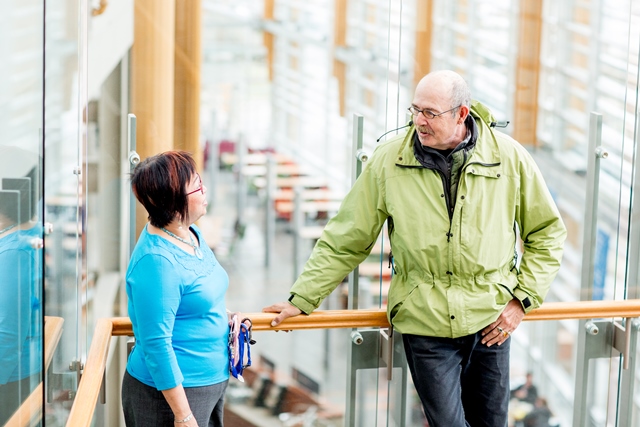
Richard Merrick knows how challenging it can be to make the transition from hospital to community, particularly for patients living with mental illness or addictions. Fortunately for Richard, during his most recent hospital admission to Thunder Bay Regional Health Sciences Centre (TBRHSC), he was connected to Psychological Associate (Supervised Practice) Maria Jones. She became his “bridging person,” establishing a therapeutic relationship with Richard in hospital and providing support during his discharge and reintegration into the community.
MORE: BREAKING DOWN BARRIERS TO MENTAL HEALTHCARE
The Council of Academic Hospitals (CAHO) is currently implementing the Transitional Discharge Model (TDM) in nine member hospitals, including TBRHSC. One of the model’s main components is support from hospital staff, who continue to have contact with a discharged client until he or she has established or re-established a therapeutic relationship with a community mental health provider.
“When patients are on the unit, they have lots of support – social worker, psychiatrist, recreationist, but when they’re discharged there’s a chance they might fall through the cracks,” says Maria, who continues to see Richard on an outpatient basis since he was discharged. “We have a rapport,” says Richard. “That’s what makes it work.”
The other component of TDM is peer support from a person who has experienced a mental illness and is living successfully in the community. People Advocating for Change through Empowerment (PACE) is a local mental health consumer/survivor organization run for and, by consumers.
MORE: NAVIGATING CONFIDENTIALITY AND SUICIDAL YOUTH
“Peer support teaches the consumers how to establish healthy relationships amongst themselves and then with others,” says Nadia Bottoset, TBRHSC’s Site Lead for the TDM Project. “Peers can be positive role models in decision-making and participation, but the most important role is that of an equal. The key to this model is that it recognizes people heal better and stay well longer when they are in healthy, therapeutic relationships. It’s about making healthy relationships while in hospital, as well as keeping them when the patient is discharged.”
Richard says he’s still facing challenges. That includes finding a new place to live, away from many of the temptations found in his current location, but he is determined to do what it takes to stay healthy. “I want it so bad my teeth hurt.”
Maria says she’s seeing the impact of Richard’s determination. “He’s making leaps and bounds. I’m proud of Richard. He’s motivated to do the hard work to be successful.”

